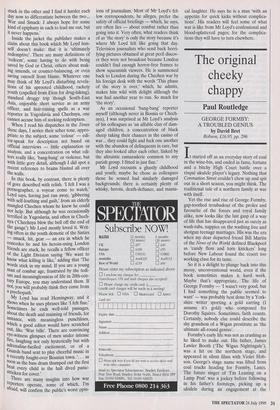Chicks, kicks, cash and chaos
Jonathan Mirsky
MY WAR GONE BY, I MISS IT SO by Anthony Loyd Doubleday, £16.95, pp. 320 ordinarily, if a reviewer uses words like pathological, heroin addict, death-seeker, war-lover and pornographer about an author, the paper's lawyers strike them out as libellous. After many admonitions, I can hear the forbidding phrase now: 'We can't possibly say that.' But Anthony Loyd uses such words about himself. His publisher puts this quotation on the jacket: 'The crackle of flames and the screech of shellfire ... an old woman with her broken teeth falling bloodily down her chest; a girl's severed ear.... My war gone by, I miss it so.' Readers of Mr Loyd's newspaper, the Times, for which he is now reporting from Kosovo, might be surprised to learn how the 33-year-old correspondent describes himself in this memoir. 'I was delighted with most of what the war offered me: chicks, kicks, cash and chaos; teenage punk dreams turned real and wreathed in gun smoke.' Elsewhere he says IHeroin] Habits tend to live longer than wars, though one keeps me stuck in the other and I fmd it harder each day now to differentiate between the two ... War and Smack: I always hope for some kind of epiphany in each to lead me out, but it never happens.'
Inside the jacket the publisher makes a claim about this book which Mr Loyd him- self doesn't make: that it is 'ultimately redemptive'. There are many definitions of `redeem', some having to do with being saved by God or Christ, others about mak- ing amends, or counter-balancing, or even saving oneself from blame. Whatever one may think of Mr Loyd's disturbing revela- tions of his uprooted childhood, rackety youth (expelled from Eton for drug-taking), standard druggy trip though South-East Asia, enjoyable short service as an army officer, and hair-raising spells as a war reporter in Yugoslavia and Chechnya, one cannot accuse him of seeking redemption.
When I read his dispatches in the Times these days, I notice their sober tone, appro- priate to the subject, some 'colour' — edi- tor-speak for description not based on official interviews — little explanation or analysis, and a concentration on what edi- tors really like, 'bang-bang' or violence, but with little gory detail, although I did spot a recent reference to brains blasted all over the walls.
In this book, by contrast, there is plenty of gore described with relish. 'I felt I was a Pornographer, a voyeur come to watch,' Loyd says, having just run away, 'gibbering with self-loathing and guilt,' from an elderly mangled Chechen whom he knew he could not help. But although he was occasionally terrified in Yugoslavia, and often in Chech- nya (`Chechnya blew the bell off the end of the gauge') Mr Loyd mostly loved it. Writ- ing often in the youth demotic of the Sixties — smack, hit, gear — an era in which he concedes he and his heroin-using London friends are stuck,.he recalls a fellow officer of the Light Division saying 'We want to know what killing is like,' adding that 'The words stick in my mind. If you are a young man of combat age, frustrated by the tedi- um and meaninglessness of life in 20th-cen- rurY Europe, you may understand them. If not, you will probably think they come from a psychopath.' My Loyd has read Hemingway, and it shows when he uses phrases like 'I felt fine.' Sometimes he ends well-told passages, about the death and maiming of friends, for instance, with meaningless punchlines, which a good editor would have scratched out, like War bills'. There are convincing eye-witness glimpses of men under intense sire, laughing not only hysterically but with adrenaline-fuelled excitement, or of a Guards band sent to play cheerful music in a recently fought-over Bosnian town. . . as soon as the bass drum thumped out the first beat every child in the hall dived panic- stricken for cover.' There are many insights into how war reporters operate, some of which, I'm afraid, will confirm the public's worst cipin- ions of journalism. Most of Mr Loyd's fel- low correspondents, he alleges, prefer the safety of official briefings — which, he says, are often lies — about combat rather than going into it. Very often, what readers think of. as 'the story' is only the story because it's where Mr Loyd felt like going that day. Television journalists who send back horri- fying pictures obtained at great peril discov- er they were not broadcast because London couldn't find enough horror-free frames to show squeamish viewers. He is summoned back to London during the Chechen war by his foreign desk with the words 'This phase of the story is over,' which, he admits, makes him wild with delight although the war had another year to run. So much for `the story'.
As an occasional 'bang-bang' reporter myself (although never in Bosnia or Chech- nya), I was surprised at Mr Loyd's analysis of his colleagues as 'an affable clan of dam- aged children, a concentration of black sheep taking their chances in the casino of war ... they could fight and fuck one another with the abandon of delinquents in care, but they also looked after each other, linked by the altruistic camaraderie common to any pariah group. I fitted in just fine.'
Mr Loyd recounts a ghastly childhood and youth; maybe he chose as colleagues those he sensed had similarly damaged backgrounds; there is certainly plenty of whisky, heroin, death-defiance, and mania- cal laughter. He says he is a man 'with an appetite for quick kicks without complica- tions'. His readers will feel some of what war is like from Mr Loyd's confessional and blood-splattered pages; for the complica- tions they will have to turn elsewhere.



























































 Previous page
Previous page